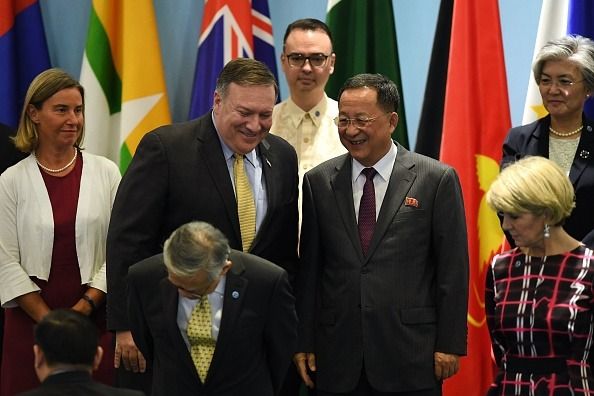Donald Trump and Kim Jong-un need the European Union
By Tereza Novotná, Alessandro Ford | May 3, 2019
 US Secretary of State Mike Pompeo (second from left) chats with North Korea's Foreign Minister Ri Yong Ho (center right) as the European Union's foreign policy chief, Federica Mogherini (left), Philippine Foreign Secretary Alan Peter Cayetano (center behind), Australia's Foreign Minister Julie Bishop (bottom right) and South Korea's Foreign Minister Kang Kyung-wha (top right) look on during the 51st Association of Southeast Asian Nations (ASEAN) Ministerial Meeting (AMM) in Singapore in August 2018. (Photo credit: MOHD RASFAN/AFP/Getty Images.)
US Secretary of State Mike Pompeo (second from left) chats with North Korea's Foreign Minister Ri Yong Ho (center right) as the European Union's foreign policy chief, Federica Mogherini (left), Philippine Foreign Secretary Alan Peter Cayetano (center behind), Australia's Foreign Minister Julie Bishop (bottom right) and South Korea's Foreign Minister Kang Kyung-wha (top right) look on during the 51st Association of Southeast Asian Nations (ASEAN) Ministerial Meeting (AMM) in Singapore in August 2018. (Photo credit: MOHD RASFAN/AFP/Getty Images.)
Much ink has been spilled analyzing the surprising turn of events at the US-North Korea Hanoi summit in late February. Accounts differ as to what happened, or which side overstepped first with its demands. At a late-night post-summit press briefing, North Korea sought to make its position abundantly clear: It would give up the nuclear production facilities in the Yongbyon complex in exchange for the lifting of post-2016 UN sanctions. The United States, on the other hand, has insisted on complete denuclearization before giving in on any sanctions relief.
Echoing the Brexiteers’ mantra, many in the United States, including several Democrats in Congress, agreed with President Trump that “no deal is better than a bad deal.” But maybe Trump walked away only because no one expected him to, possibly sending a signal to the Chinese that they, too, should budge on US demands unless they want to suffer a similar loss of face in the ongoing US-China trade talks.
Whatever the case may be, since the summit’s failure, National Security Advisor John Bolton and other hawks appear to be running the show in Washington, with Trump shrugging off Kim Jong-un’s year-end “deadline” for a change in the US stance. In sum, US-North Korea negotiations are stuck between a rock and a hard place. Although it seems unlikely Trump will turn to the European Union for help at this stage, it is his best chance for breaking the impasse.
Money and muscle. In the midst of all the disarray, it’s easy to forget this drama has more than two actors. The costs of the 1994 Agreed Framework, which succeeded in temporarily freezing North Korean progress toward developing nuclear weapons, were borne overwhelmingly by South Korea and Japan. However, the global agreement would have fallen apart entirely if it wasn’t for a third major participant: the European Union.
Back then, the EU envisaged spending 75€ million (equivalent to about $84 million at the current exchange rate) over five years. Today, the EU might be willing to spend up to 1€ billion over 10 years, according to a source who has spoken with a senior official in the EU’s diplomatic service. That same source told us that Washington has been reviving talk of a “multilateral” settlement—a signal for other countries to get their wallets out. Most important, though, any North Korea deal, whether multilateral or bilateral, is going to require multinational safeguards. How else can Kim Jong-un be assured Trump (or his successor) will keep his word?
China has been portraying itself as a potential intermediary, and Beijing will undoubtedly be involved in any international agreement. However, China has too many direct stakes in how negotiations go with North Korea to be seen as a neutral mediator. Like last time, the EU must be one of the guarantors. It’s in everyone’s interest that Brussels, a global power with influence across the region, be involved in any deal between Washington and Pyongyang. The EU can, and wants to, be much more than a piggy bank. But in return, it must be upgraded from “payer” to “player.”
Within East Asia, Europe enjoys blossoming partnerships with Seoul and Tokyo and a baggage-free relationship with Pyongyang and is Beijing’s biggest trading partner. But the EU is more than just a market power. It also has the diplomatic muscle necessary, including unrivaled experience in negotiation with numerous counterparts across diverse areas and varied formats, from the Iran deal to EU expansion. It employs an army of skilled diplomats. Even Trump once quipped that he wished Jean-Claude Juncker, the current president of the European Commission, negotiated for him. Furthermore, Europe’s new “connectivity strategy” aims at just such projects as, say, building a railway from Paris to Seoul. If the EU is serious about its “rebalancing” toward Asia, the Korean peninsula could be the ideal geopolitical gateway.
Roadblocks ahead. That doesn’t mean there aren’t obstacles, though. The last decade of EU-North Korea policy, termed “critical engagement,” has seen a lot more “critical” than “engagement.” Brussels leapt on the maximum-pressure bandwagon, and even went beyond the UN-designated sanctions in imposing independent ones in 2006 and again in 2018. Yet Europe did draw the line in 2017, when Trump pressed Germany and other EU members to close their Pyongyang embassies—which they refused to do.
The EU’s de facto foreign minister, Federica Mogherini, remains personally sympathetic to a more proactive approach. She reached out to North Korea’s foreign minister Ri Yong Ho at the ASEAN Regional Forum in Singapore in August 2018. At that meeting, South Korea, Japan, China, the EU, and the United States all wanted bilateral summits with Ri; only China and the EU got them. But Mogherini’s term ends this October. She won’t seek reappointment and, as the chief architect of the Iran deal, she has other priorities than North Korea.
North Korea continues to see the EU as a power in its own right, though. In November 2018, when the European Parliament’s Delegation for Relations with the Korean Peninsula paid a courtesy visit to Pyongyang, a jubilant Rodong Sinmun (North Korea’s state newspaper) splashed the event across four of its issues. North Korea’s foreign affairs ministry covers all EU member states and EU institutions within one department—in contrast to many other countries, including South Korea, that still split their diplomacy toward Europe into East and West sections, along Cold War lines.
There’s room for improvement in diplomacy between the EU and North Korea, yet there are leaders within Europe who are ready to step up to the challenge. Last month, Sigmar Gabriel, Germany’s former vice-chancellor and foreign minister, now a parliamentarian, visited Pyongyang to “see the country with his own eyes.” It was the highest-level visit from Europe yet. Gabriel was received both by the North Korean foreign minister Ri Yong Ho and by Ri Su Yong, the director of the international department of North Korea’s Workers’ Party and a high-ranking member of its politburo.
A way forward for Trump. If Washington wants to break the deadlock with North Korea, Trump would do well to start assessing how to deploy the EU. There are at least seven possible ways in which Brussels could help:
Resume dialogue. In 2014, the EU dropped its Human Rights dialogue with North Korea. A year later, the EU-North Korea Political Dialogue took place in Pyongyang – the first and only one since 2011. Resuscitating one of the suspended dialogues, perhaps starting with less controversial human rights—such as labor rights and the rights of the disabled—could serve as an olive branch. A values-based focus would not preclude the senior official who would lead such a dialogue from discussing other issues. Alternatively, the EU could nominate a Special Envoy for Peace on the Korean Peninsula – sending a clear signal to the Koreas, and the United States, that the EU is ready to talk.
Offer the EU’s verification expertise. Even if Brussels were interested in exporting its Iran role to Korean diplomacy, Trump would hardly be willing to agree to anything similar to what he has called the “worst deal ever.” Yet the EU can provide, and pay for, the verification mechanism should any denuclearization promises by Pyongyang materialize. European inspectors scouring North Korean missile launch sites would be more acceptable to Pyongyang than American experts, while still infinitely more palatable to the United States than Chinese (or Russian) inspectors.
Open embassies. Let Pyongyang move their double-accredited embassy from London to Brussels. It makes sense after Brexit, and the North Koreans have been begging for this since relations were established in 2001. More important, open an EU Delegation in Pyongyang. Although the Ambassador to Seoul is the EU’s de facto emissary for both Koreas, and the EU has seven member-state embassies in North Korea, opening a Pyongyang EU mission would be a clear declaration that Brussels is open for business. It could also serve as a model for the liaison offices Washington and Pyongyang never got around to agreeing to in Hanoi.
Resume humanitarian aid. Despite their tough stance on nuclear issues, Paris and London have reportedly been pressing the United States to return to former levels of humanitarian aid. Nongovernmental organizations are currently tied up in sanctions-related red tape and unable to provide help to those in need. The EU has been encouraging the United States to resume aid—not least because, even at this stage, Europe is North Korea’s largest donor, through the European Commission’s Food Security Office. From the North Korean perspective, humanitarian aid could be seen as a token form of sanctions exemption, notwithstanding the principle that aid should never be a political football.
Promote the EU as a convening point. Sweden has been hosting influential North Korean officials for talks with retired or back-bench European politicians. In the run-up to the Hanoi summit, US Special Representative for North Korea Stephen Biegun met his counterpart, Vice Foreign Minister Choe Son-hui, in Stockholm. Brussels has organized international high-level conferences on Syria and Afghanistan; why not North Korea? In Hanoi’s anticlimactic aftermath, the South Koreans have already started turning to unofficial talks—this is clearly where Europe should step in.
Drop the EU’s autonomous sanctions. They’re purely symbolic and aimed at appeasing Washington. Even in its heyday, EU-North Korea trade could have practically been counted by abacus. Even if Trump’s maximum-pressure campaign forced Kim to the negotiating table, it certainly wasn’t because Pyongyang was running short of Mercedes S600s and pinot noir. Aside from frustrating any potential dialogue, EU sanctions also annoy the other Korea. South Korean President Moon Jae-in failed to secure sanctions relief for North Korea during his recent visit to Washington, and got a firm “non” when he asked his European friends to lift some restrictive measures during his visit to Brussels last October, but a lifting of some EU sanctions could demonstrate what a phased approach might look like.
Promote educational opportunities. Cambridge University used to host a yearly pair of North Korean students, and recently the Free University of Berlin and Kim Il Sung University have signed a memorandum on exchanges. Other universities should follow. The EU can also encourage Pyongyang to accept more Europeans into its universities. Such contacts promote people-to-people interactions and foster trust between countries. Eventually, the EU’s flagship Erasmus program—which funds student exchanges within the EU and with other European countries that have close relationships with the EU—could even be extended to North Korea.
An experienced mediator. With Trump’s habit of pulling the rug out from under treaties, and even leaving his counterparts out in the cold as we saw in Hanoi, Kim Jong-un needs a pillar to anchor any potential settlement. The Iran nuclear deal, the Paris climate accord, the free trade agenda, and other issues demonstrate that the EU is willing to stand up to Washington in defending multilateral arrangements. On the other hand, despite all the transatlantic tensions, Europe remains America’s strongest ally on issues such as the fight against terrorism and support for a peaceful resolution in Venezuela.
With regard to North Korea, the Trump administration has so far seen the EU as a useful tool in mobilizing support for implementing sanctions. In fact, Biegun came to London earlier in March to lobby for that. But Trump and his lieutenants should realize that the EU has an extensive toolbox not only for exerting international pressure but, perhaps even more so, for mediating the situations that seem hard to crack. After all, daily negotiation among 28 countries is the best school for that.
Even if a more productive Trump-Kim 3.0 takes place within a few months, once any agreement is in its nitty-gritty implementation stage, the best chance for it to stick in the long run is to deploy the EU. The alternative is much less appealing: a possible return to the period of “fire and fury” or worse, which no one wants. Once the new version of strategic patience runs out, Donald Trump and Kim Jong-un will need the European Union’s help.
Together, we make the world safer.
The Bulletin elevates expert voices above the noise. But as an independent nonprofit organization, our operations depend on the support of readers like you. Help us continue to deliver quality journalism that holds leaders accountable. Your support of our work at any level is important. In return, we promise our coverage will be understandable, influential, vigilant, solution-oriented, and fair-minded. Together we can make a difference.
Keywords: European Union, Kim Jong-un, North Korea
Topics: Nuclear Risk, Nuclear Weapons, Voices of Tomorrow















